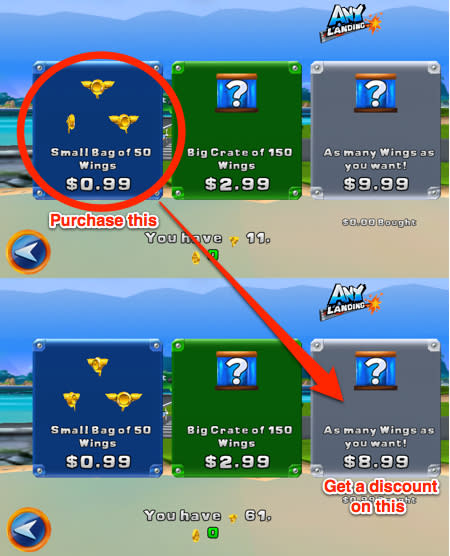This is how in-app purchases should be handled

Ever since the ability to include in-app purchases was added to the App Store, the idea has divided gamers. On one side you have customers who prefer the traditional manner of purchasing a game -- pay upfront, and you have access to whatever the game has to offer -- while others see no problem in getting a game for free and then paying for perks, in-game currency or additional game modes.
There are arguments to be made for either sale method, but we've not seen anything in the way of a quality compromise between the two, until now. Developer Strange Flavour has introduced a new in-app purchase model in its new game Any Landing, and it's designed to please both camps.
Strange Flavour calls it the "Play Nice" model, and here's how it works:
The core game can be either free or paid, it doesn't really matter. Any Landing is indeed free.
Like most in-app purchase games, there are several tiers of goods available (in Any Landing the purchasable currency is called "Wings").
Along with the incremental boosts, there is an "All You Can Eat" option that unlocks everything, and locks the ability to make any in-app purchases, even accidentally.
Each time you purchase one of the smaller boosts, the amount you paid is deducted from the All You Can Eat price.

This system is superior to what we are currently used to from IAP games for a couple of reasons, but most important is the fact that when you make a purchase, you're always working toward an end, rather than simply stuffing your digital wallet for a day or a week. One of the main arguments against games that rely on in-game transactions is that they're never-ending, and feel more like you're throwing money into a void than actually paying for the game. With Play Nice, every cent you put in rewards you in the same way as it would in your average game, but it also brings you a step closer to owning everything the game has to offer.
Play Nice also solves the problem of parents who find unexpectedly massive App Store bills after letting their kids have a go at some in-game boosts with their credit card. No matter what, only a set amount can be spent on a game that uses the Play Nice model. Even if you delete the game or re-download it on another device, you can restore your previous purchases for free, ensuring you never double pay.
Now, I understand that some games -- Candy Crush Saga and Clash of Clans come to mind -- benefit from players paying massive amounts of money to keep their in-game performance at a peak, but these are extremely rare and special cases. Your average developer never sees the type of rabid fanbase that warrants in-app purchase options of US$59.99 or $99.99, and a payment system like Play Nice gives would-be players an incentive to spend a few bucks now, and then maybe a few more bucks later, as opposed to trying out a game, seeing how much it costs to "win" and then never bothering to try.

